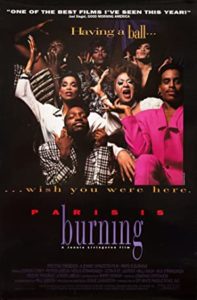Tropic Sprockets / Paris Is Burning (1990)
By Ian Brockway
 For Pride month, the Tropic is showing the groundbreaking documentary on drag performers in New York City, “Paris Is Burning” by director Jennie Livingston. [For showtimes and trailers, check Tropiccinema.com.] This engrossing and thoughtful film is dynamic and poignant, spontaneous and empathetic, with a painterly visual eye. It remains a standalone classic and is a genuine time capsule of a culture set in the mid to late 1980s.
For Pride month, the Tropic is showing the groundbreaking documentary on drag performers in New York City, “Paris Is Burning” by director Jennie Livingston. [For showtimes and trailers, check Tropiccinema.com.] This engrossing and thoughtful film is dynamic and poignant, spontaneous and empathetic, with a painterly visual eye. It remains a standalone classic and is a genuine time capsule of a culture set in the mid to late 1980s.
Several performers are interviewed. Pepper LaBeiga relates that her mom freaked out at her son wearing a women’s mink coat and carrying the scent of perfume. It was a bridge too far for her. Pepper counters that she would not mind fame, but she would be very generous with her luxury, saying that she wants her children to travel with her.
Dorian Corey is “old school” believing in big hair and furs. She is a proponent of creating her image without ready-made big brand accessories. “Nowadays all you need is a designer name.” she says. Asked about fame, Corey shrugs. “One wants to leave something behind to make a mark…it’s more important to have fun… but if you live and make it then you have made a mark…you don’t need to bend the whole world.”
Wise words.
Willi Ninja says she picked her name because ninjas are warriors, invisible and deadly. He helped transform voguing into an art form.
Octavia St. Laurent idolizes model Paulina Porizkova and wishes to be a household name.
Perhaps the most affecting interview is with Venus Xtravaganza who says she has been violently attacked. She wants everything a real woman has, including a house, nice clothes, and the ability to travel.
Sadly, virtually all the performers interviewed here have since passed away due to cancer, AIDS or domestic violence. Venus was found strangled under a bed at the Duchess Hotel. The killer has yet to be discovered.
This immersive film treats the performers as human and complete with a genuine philosophy, not freaks or misfits. Drag performers are artists and shapeshifters, but many of them want to be someday counted as equal to women, if not women themselves. Some of the artists, but not all, have undergone sex change surgery.
Each person featured is at home when strutting or dancing on stage at a Ball. Balls are kinds of wars or contests, where groups perform for local superstardom. The contests demand discipline and excruciating practice similar to physical sport. Some performers take modeling classes.
Each person in the film deserves her own unique biopic.
Above all, the film celebrates these performers as personalities woven in the fabric of many groups and genres. Drag is knitted within Hip Hop. It is within Hispanic and African American history.
In short, Drag culture is human culture.
Write Ian at [email protected].
[livemarket market_name="KONK Life LiveMarket" limit=3 category=“” show_signup=0 show_more=0]




No Comment